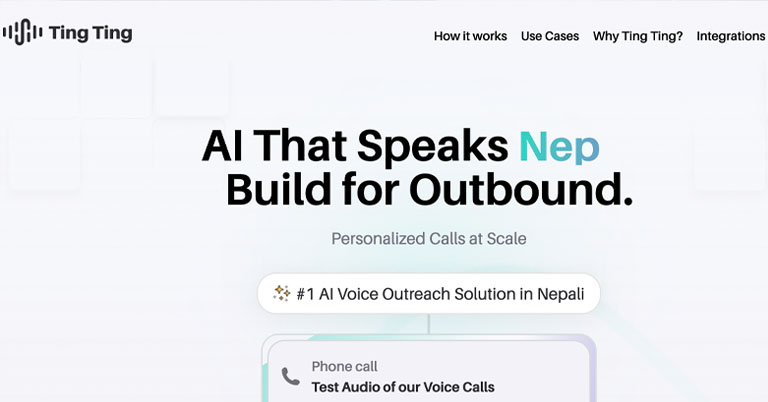A new Nepali‐language AI voice platform has begun operating in Nepal, aiming to simplify large‐scale phone outreach for local organizations. Dubbed TingTing, the tool offers automated calls in Nepali and English, allowing institutions to connect directly with clients or members without relying on live agents.
TinTing Overview
Personalizing Calls in Nepali

TingTing lets users upload their contact lists and write short scripts—either in Nepali or English. Once a campaign is set up, the system inserts each recipient’s name into the message, giving calls a more human touch. This small detail can help reduce the awkward feeling often associated with generic automated calls and makes the interaction feel less mechanical.
Simple Campaign Setup and Tracking
After uploading contacts and scripts, organizations choose when and how calls are delivered. During the campaign, administrators get real-time updates on who has answered, who has missed the call, and any failed attempts. This live tracking removes guesswork: there’s no need to wait days to learn whether messages reached their audience. Instead, teams can follow up immediately if someone hasn’t picked up.
Plugging Into Existing Workflows
TingTing integrates with common customer-management systems, meaning banks, schools, and government offices can automate routine outreach—like payment reminders or policy alerts—without overhauling their entire software setup. Once linked, the AI platform pulls contact details automatically and reports call status back into the same system, saving time and avoiding redundant data entry.
Early Adopters Across Sectors
Local banks, microfinance groups, insurance companies, and educational institutions have already started testing the platform. Some use pre-recorded voice clips, while others rely entirely on AI-generated Nepali speech. Regardless of the approach, each institution says the ability to address callers by name and speak in Nepali feels more natural for recipients.
- Also, read
Growing Need for Nepali AI Solutions
As more businesses and public bodies in Nepal embrace digital tools, demand is rising for AI that “gets” Nepali language and cultural nuances. Rather than generic call centers or English-only scripts, organizations now want software that speaks directly to Nepalis in their own tongue. TingTing’s launch highlights this shift—localized solutions are no longer a luxury but a necessity.
TingTing: Is AI worth defending?
Still, there’s reason to pause and reflect. I do not mean in any way that AI-driven calls do not spare us from the headache of tedious calls that often feel meaningless or alienating, but they raise questions about how our social fabric might change. If machines handle human interactions, what happens to the jobs once done by people, all agents who listened, understood accents, or offered empathy? Beyond employment, there’s a risk that our world starts to feel plastic: genuine human connection can be masked by a veneer of AI efficiency. In that sense, our relationships already mediated by screens and text messages might grow even more abstract, with “real” voices replaced by synthetic ones. As Nepali institutions explore platforms like TingTing, it’s definitely worth asking ourselves how much we’re willing to let AI soften or even erase parts of our human exchange
Article Last updated: June 5, 2025

.gif)











